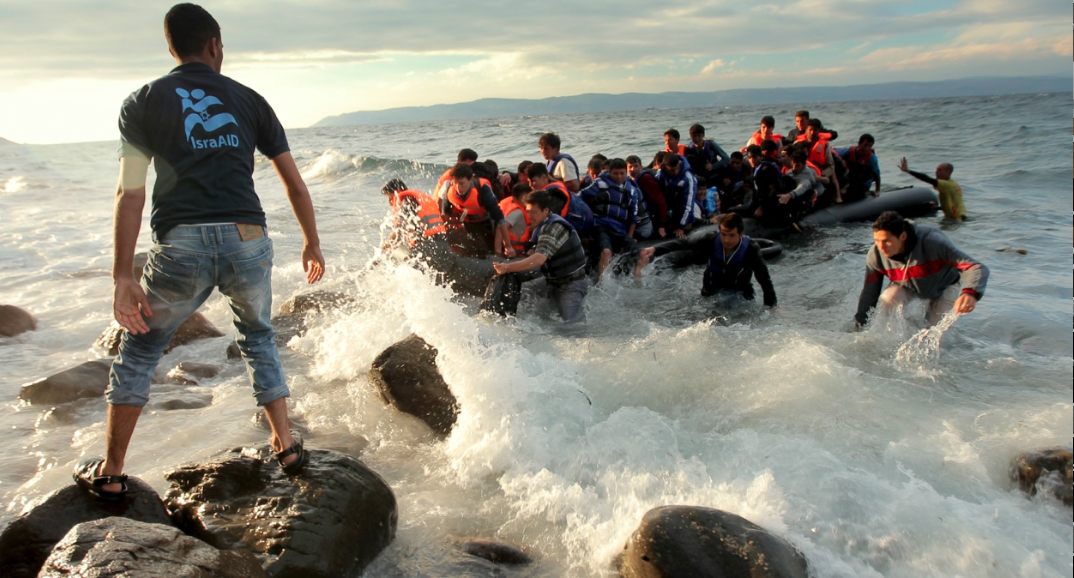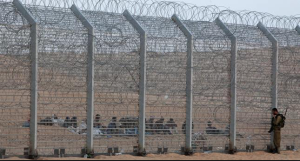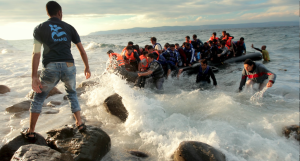Israel and the Syrian Crisis
 http://www.thetower.org/article/humanitarian-heroes-in-a-wrathful-world/
http://www.thetower.org/article/humanitarian-heroes-in-a-wrathful-world/
At the 15-member UN Security council, Secretary-General Ban Ki-Moon urgently called on all member nations to “enable humanitarian assistance everywhere it is needed […] for the Syrians to negotiate a way out of the hell in which they are trapped.” and went even further, saying “You have now no higher responsibility in your service as members of the UN Security Council.” This past summer, UN count estimates worldwide displacement at an all-time high of 65.3 million. To put this into perspective, the number of people fleeing war, conflict and persecution would form the ”21st largest (nation) in the world,” in other words a country as populated as the United Kingdom, or in perhaps even more striking terms, every 113th person in the world today is now either a refugee, internally displaced, or seeking asylum.
Also at an all-time high however, are the various terrorist attacks targeting civilians in Europe and the Middle East, and recently in the United States as well. With the increase in terrorist threats and violence across the globe, the Western political climate is shifting, as people become increasingly wary of those seeking refuge. Reuters correspondent, Filippo Grandi states: “The rise of xenophobia is unfortunately becoming a very defining feature of the environment in which we work […] Barriers are rising everywhere – and I’m not just talking of walls. But I’m talking about legislative barriers that are coming up.” Indeed, today’s political context is one in which societies find themselves trapped in self-perpetuating cycles of fear and resentment, with every new attack threatening the collective’s sense of human compassion regarding the crisis. Such cycles create a reality where a new vision of the refugee emerges, not as someone fleeing from danger, but as someone who may present a risk where there was not one before.

A reported 86% of refugees are being sheltered in low and middle-income countries. Turkey leads with 2.5 million, followed closely by neighbouring countries: Pakistan, Lebanon, the Islamic Republic of Iran, and Jordan. Meanwhile, tensions between European states are rising due to “[the] disproportionate burden faced by some countries, particularly […] Greece and Italy” as the points of entry to the EU for the vast majority of migrants. This resulted in a relocation scheme to relieve some of the pressure faced by those countries under which “asylum seekers would be distributed [according to] a formula that looks at each EU country’s size, economic strength and past history of taking in migrants.” However, figures provided by the European Commission demonstrate that member states have “utterly failed to provide anywhere near the number of places that they formally agreed to.” Of the 135,000 people who are being held in Italian reception facilities and the tens of thousands more in similar circumstances in Greece, Belgium has relocated 29 people, the Czech Republic 0, Lithuania 0, Spain between 40 and 50, and France 181.
Even as Europe and America fail to live up to their moral obligations and stated promises, it is interesting to note that one country, Israel, geographically close to the destruction in the Middle East, has remained on the sideline. From the beginning of the crisis, Israeli PM Benjamin Netanyahu “rejected calls from opposition politicians for Israel to accept refugees from Syria’ on the basis that Israel ‘lacks demographic and geographic depth.” Yesh Atid chair and former Israeli Finance Minister Yair Lapid echoed Netanyahu’s firm stance, stating that Israel “cannot afford to get into the matter of the refugee crisis” as this could “open a back door to discussing the right of return for Palestinians.”
There are many reasons contextualizing Israel’s bystander approach to the crisis, but one of the more compelling is the fact that “Syria and Israel are themselves technically in a state of war.”
Israel and Syria have indeed fought three major wars, including the 1948 Arab-Israeli War, the Six-Day War of 1967 (in which Syria’s defeat allowed Israel’s capture of the Golan Heights), and Syria’s joint effort with Egypt to attack Israel in the Yom Kippur War of 1973.
Moreover, relations have remained deeply strained by Syrian omission to officially recognize the State of Israel since its establishment in 1948. Despite attempts to reopen channels of communication and diplomacy, nothing concrete has occurred. Any degree of cooperation between the two countries has been restricted to the limited apple trade between Israel and Druze farmers of the Golan Heights, which began in 2005 and is mediated by the International Committee of the Red Cross (ICRC).
All this to say, no matter how depressing or dire the circumstances, when it comes to Israel and its policy towards Syrian refugees, the lens through which it views its role and responsibilities in the crisis has been tainted to near opaqueness. The fundamental paradox that paralyses Israeli policy can be attributed to both internal and external cultures since the state was first established. Israel “has long been torn between the humanitarian obligation of taking in non-Jews in need and fears about maintaining its Jewish character and security in a hostile and increasingly chaotic region.”

Indeed, the internal conflict that Israel faces is no more apparent than in the clash, or one could say contradiction, between its commitment to international laws and its own domestic policy implementations. Take the 1951 UN Convention relating to the status of Refugees and the 1954 and 1961 Convention on the Reduction of Statelessness, which legally binds Israel to identify a refugee as a someone “owing to well-founded fear of being persecuted for reasons of race, religion, nationality […] or owing to such fear is unwilling to avail himself of the protection of that country […] or unwilling to return to it.” However, in the same year, Israel also enacted the Prevention Infiltration Law of 1954, which materialized over the concern of how to address those Palestinians wishing to return. “The law was tailored to prevent access to all ‘infiltrators’, meaning ‘persons who are not Israeli residents, […] and have entered Israel via a border that has not been designated as an international border crossing by the Minister of Interior.”
Today, Israel finds itself with an estimated 65,000 refugees from Sub-Saharan Africa who entered Israel illegally between 2006 and 2013. The influx of “infiltrators” has created fear that the demographic changes resulting from “a wave of impoverished Africans, mostly Muslims from Sudan and Christians from Eritrea, would overwhelm the Jewish nature of the state.”
Perhaps the immediate concern regarding refugees from Syria and Sub-Saharan Africa resides in the political cultures they have grown up in prior to their displacement, many of which are extremely hostile to the image of Israel. The fear is therefore not in the refugee himself but in the climate that he or she has known, and the conceptualizations of Israel that those experiences have bred, which could ultimately threaten the security of the Jewish state and of its people. “These security concerns are reflected in the PHPAS provision where [Israel] reserves the right not to absorb into Israel and not to grant permits to stay in Israel to subjects of enemy or hostile states.”
The only issue with this, of course, are the number of countries are automatically cast as ‘enemies,’ since Israel shares its borders with Egypt, the Gaza Strip, Jordan, Lebanon, Syria and the West Bank – all of which are either the fated residue of Israel’s creation or have been at war with it at some point in its history.
It’s worth mentioning that Israel’s stance towards the refugee crisis has been far from unified within Parliament. Isaac Herzog, leader of the centre-left Labour Party and head of the opposition voiced great concern about Netanyahu’s tough-love approach, stating that “Jews cannot remain indifferent when hundreds of thousands of refugees are seeking safe harbour.” He went on to add“[o]ur people experienced first-hand the silence of the world, […] and cannot be indifferent in the face of the rampant murders and massacres taking place in Syria.”
These statements communicate the dilemma the crisis presents within Israel’s domestic politics, as it divides parliamentary representatives on issues of responsibility and security, and whether the country should risk its own security for the sake of another’s.
For the time being however, Netanyahu remains firm in his position of “secur[ing] [Israel’s] borders against African migrants and Islamist militants.” This domestic agenda is reinforced by the walls that line its borders on all fronts including along Egyptian, Lebanese and Syrian territorial lines.
Still there is some hope that things will change. Whilst Israeli politicians erect physical barriers, Israeli-based NGOs such as IsraAID are working to diminish and ultimately tear down historical and psychological barriers between the refugees and Israel. The association has established prominent bases in countries including Germany, Greece, Serbia and Croatia, where its contributions “rang[e] from emergency aid distributions to pinpointed trauma support and prevention training for host country government and non-government professionals.” IsraAID is the only “Israeli-based Jewish organization on the ground in Europe assisting refugees and receives its funding from independent sources -‘mainly from Jewish federations, B’nai Brith International, the American Jewish Committee, and various other organizations.” While IsraAID is doing important work it must be noted that as in every country, citizens are not their governments, and will often extend a helping hand in order to remind the world that they are not bound by their country’s own intransigence or inaction. Missions such as IsraAID point to the diversity of opinion regarding the Israeli response towards the Syrian refugee crisis.
Only time will tell whether the government will be persuaded by the acts of some of its citizens or remain paralyzed by the greater challenges of national safety and security concerns which are the priority of their citizenry to whom they are first and foremost accountable.
